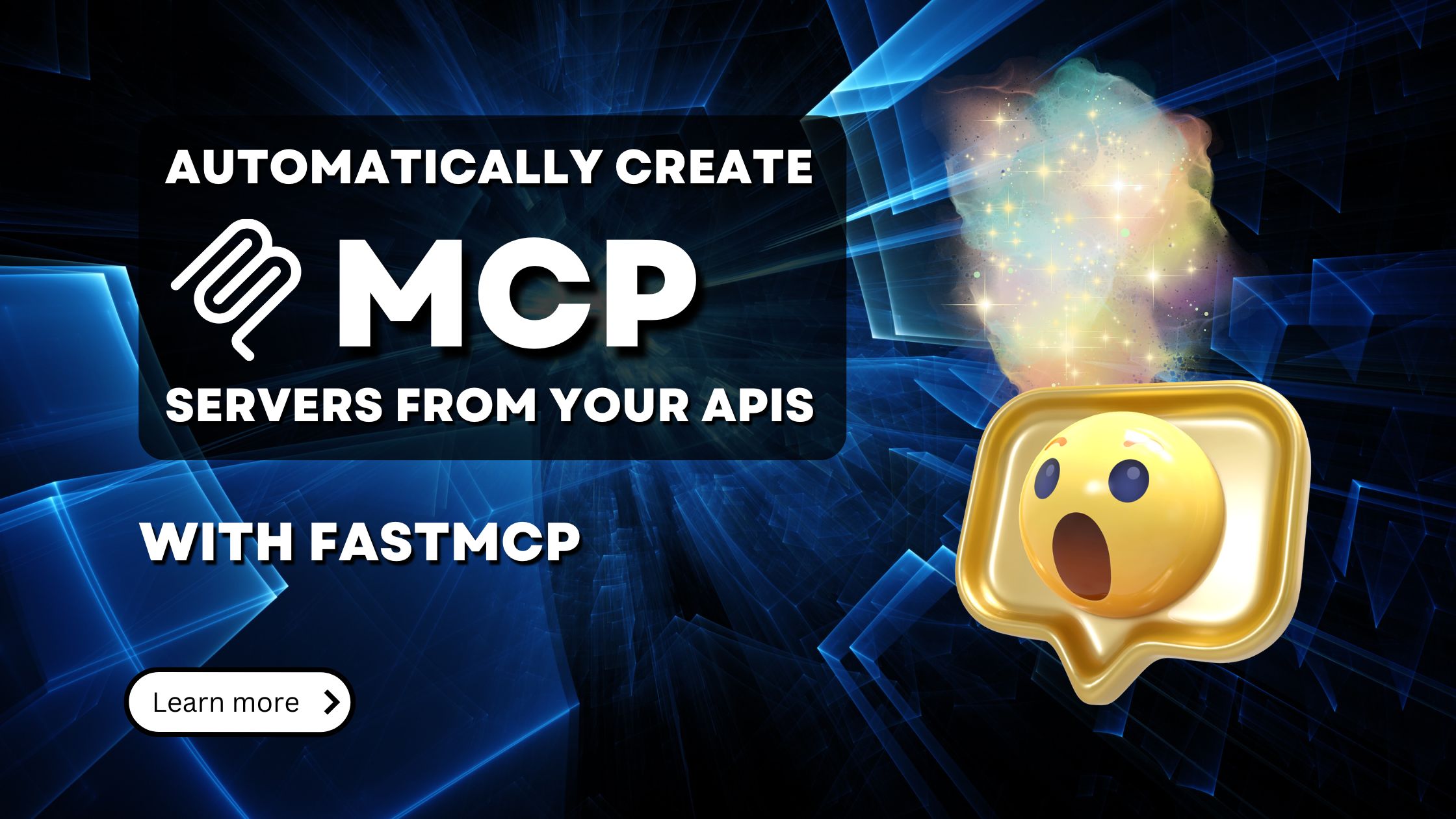- Pondhouse Data OG - We know data & AI
- Posts
- Pondhouse Data AI - Tips & Tutorials for Data & AI 28
Pondhouse Data AI - Tips & Tutorials for Data & AI 28
Rethinking AI Reasoning | Turn APIs into MCP Tools | Cursor IDE Gets Serious with 1.0 Release

Hey there,
This week, the AI world hit some big milestones—and we’re breaking them down for you. We’ll show you how to automatically spin up MCP servers from existing APIs, explore a developer-first task manager built around Claude, and take a closer look at Mistral’s sovereign infrastructure offering.
Plus: While all major AI players push ahead with reasoning-focused models, Apple’s latest research casts doubt on the entire direction—arguing these systems might not be “thinking” at all.
Enjoy the read!
Cheers, Andreas & Sascha
In today's edition:
📚 Tutorial of the Week: How to turn any OpenAPI or FastAPI app into an MCP server with FastMCP
🛠️ Tool Spotlight: Claude Task Master – a command-line project manager with Claude, GPT, and MCP support
📰 Top News: Behind the Curtain: Apple Debunks “Thinking” AI Models
💡 Tips: Mistral Compute – build your own full-stack, sovereign AI infrastructure
Let's get started!
Find this Newsletter helpful?
Please forward it to your colleagues and friends - it helps us tremendously.
Tutorial of the week
Automating MCP Server Creation from OpenAPI and FastAPI

If you've already built a REST API using OpenAPI or FastAPI, you're just a few lines of code away from making it accessible to AI agents through the Model Context Protocol (MCP). In our latest blog post, we demonstrate how to automate MCP server creation using FastMCP, enabling seamless integration with the LLM ecosystem.
⚡️ From OpenAPI to MCP in Seconds
FastMCP version 2.0.0 introduces the ability to generate an MCP server directly from your OpenAPI specification. This feature allows you to bridge your existing API infrastructure with the LLM-friendly MCP ecosystem effortlessly. By analyzing your OpenAPI spec, FastMCP automatically maps endpoints to MCP components:
Resources: Read-only endpoints (e.g.,
GET /stats)Resource Templates: Parameterized read endpoints (e.g.,
GET /users/{id})Tools: Action-oriented endpoints (e.g.,
POST /users)
You can also customize these mappings using RouteMap objects to fit your specific needs.
🧩 FastAPI Integration
For those using FastAPI, FastMCP offers seamless integration. By invoking FastMCP.from_fastapi(app), you can convert your FastAPI application into an MCP server with minimal code changes. This method supports all FastAPI features, including authentication, and ensures efficient communication between your MCP server and FastAPI application.
🛠️ Configuration Options
FastMCP allows you to configure server timeouts and route mappings:
Timeout Configuration:
mcp = FastMCP.from_openapi( openapi_spec=spec, client=api_client, timeout=5.0 )Custom Route Mapping:
from fastmcp.server.openapi import RouteMap, RouteType custom_maps = [ RouteMap(methods=["GET"], pattern=r"^/database/.*", route_type=RouteType.TOOL), RouteMap(methods=["POST"], pattern=r"^/user/profile/status", route_type=RouteType.RESOURCE), ] mcp = FastMCP.from_openapi( openapi_spec=spec, client=api_client, route_maps=custom_maps )
These configurations provide flexibility in tailoring the MCP server to your application's requirements.
✅ Why It Matters
By automating MCP server creation, you can:
Expose your existing APIs to LLMs without extensive rework
Leverage the MCP ecosystem for enhanced AI integration
Maintain consistency and efficiency in your development workflow
This approach streamlines the process of making your APIs LLM-ready, facilitating broader adoption and utility.
For more details read our blog post here:
Tool of the week
Claude Task Master – AI-Powered Project Management for Developers
Claude Task Master is an open-source, AI-driven task management system designed to integrate seamlessly with development environments like Cursor, Lovable, Windsurf, and Roo. It leverages large language models (LLMs) such as Claude, OpenAI, Gemini, and Mistral to assist developers in planning, organizing, and executing tasks efficiently.
🛠️ Key Features:
AI-Driven Task Management: Utilizes LLMs to parse project requirements, generate task lists, and provide step-by-step implementation guidance.
Multi-Model Support: Compatible with various AI providers, allowing users to define main, research, and fallback models for enhanced flexibility.
MCP Integration: Supports the Model Context Protocol (MCP), enabling direct interaction with AI models from within the code editor.
Customizable Workflows: Offers commands for parsing PRDs, listing tasks, showing next steps, and generating task files, all customizable to fit individual project needs.
Cross-Platform Compatibility: Designed to work across different operating systems and development environments.
Claude Task Master streamlines the development process by automating task management and integrating AI assistance directly into the developer's workflow.
Top News of the week
The Illusion of Thinking — Apple’s Reality Check on Reasoning Models
As most of the AI world races toward more powerful reasoning-first models, Apple is taking a more skeptical—and arguably more scientific—stance. In a new study titled “The Illusion of Thinking”, Apple researchers show that leading AI systems still break down completely when faced with truly complex reasoning tasks.

🧠 What Did They Test?
Apple evaluated some of today’s top "Large Reasoning Models" (LRMs)—including o3-mini, Claude 3.7 Sonnet, and DeepSeek-R1—on classic logic puzzles like:
Tower of Hanoi
River Crossing
Parity Tasks
These aren't toy tasks—they’re simple but well-structured problems where the solution steps are clearly defined and logically solvable.
🚨 Key Finding: Accuracy Collapses Under Pressure
As the complexity of tasks increased, model performance fell apart. And not just gradually—Apple describes it as a “complete accuracy collapse.” Even more surprisingly:
Models reduced their inference-time tokens, suggesting they were effectively giving up on hard problems.
Providing correct algorithms didn’t help—the models still failed.
The behavior appears model-agnostic: it happened across multiple architectures and sizes.
🤔 Why It Matters
While companies like OpenAI, Anthropic, and Google are pushing deeper into reasoning capabilities, this study serves as a critical reminder: we’re not there yet. Larger models don’t necessarily mean smarter models—and today’s LLMs often lack the persistence and general reasoning flexibility that even a child possesses.
📌 The Takeaway
Apple’s research calls for rethinking how we evaluate reasoning in AI, especially before deploying these systems in mission-critical settings. Scaling might be part of the solution—but without breakthroughs in underlying reasoning architecture, current models may always fall short in real-world complexity.
Also in the news
OpenAI Launches o3-pro and Cuts o3 Pricing by 80%
OpenAI has introduced o3-pro, its strongest reasoning model yet, alongside a dramatic 80% price cut for o3, now matching GPT-4.1 at $2 input / $8 output per million tokens. This positions o3 as a highly cost-effective option for reasoning tasks, while o3-pro offers even stronger performance for premium use cases.
ElevenLabs Launches Eleven v3 (Alpha) – Their Most Expressive Text-to-Speech Model Yet
ElevenLabs has introduced Eleven v3 (Alpha), a cutting-edge text-to-speech model designed to deliver highly expressive and emotionally rich speech synthesis. This new model supports over 70 languages and introduces advanced features like inline audio tags (e.g., [excited], [whispers], [sighs]) for nuanced control over tone and delivery.
Additionally, Eleven v3 offers a Dialogue Mode, enabling the creation of natural-sounding conversations between multiple speakers, complete with appropriate pacing and emotional context.
Mistral Releases Magistral – Its First Reasoning Model Series
Mistral has launched Magistral, a reasoning-focused model family featuring an open-source 24B model and a more powerful enterprise-grade variant. Designed for multilingual, transparent, and domain-specific reasoning, it positions Mistral as a serious European competitor in the reasoning model space.
Google Pushes Gemini Further with 2.5 Pro Preview
Google has released a preview of Gemini 2.5 Pro, its most advanced AI model to date. This iteration boasts enhanced reasoning capabilities, improved coding performance, and robust multimodal understanding across text, audio, images, and video. Notably, it features a 1 million token context window, facilitating complex task handling. The model is currently available in preview and is slated for general availability in the coming weeks.
Cursor IDE Hits First Major Release with Key Upgrades
Cursor hits version 1.0 with a packed release: BugBot for automatic PR reviews, general access to Background Agent, Jupyter Notebook support, Memories, and one-click MCP server setup. It’s a big step forward for AI-assisted coding workflows.
Tip of the week
Mistral Compute — Sovereign AI Infrastructure, Built for You
Mistral AI has unveiled Mistral Compute, a private, full-stack AI infrastructure platform designed to give enterprises, governments, and research institutions complete control over their AI environments. This initiative marks a significant step toward democratizing access to high-performance AI systems, moving beyond reliance on U.S. and China-based cloud providers.

🧰 What is Mistral Compute?
Mistral Compute offers a customizable AI infrastructure stack, including:
Hardware: Access to tens of thousands of NVIDIA GPUs, including the latest Grace Blackwell Superchips.
Software: A suite of orchestration tools, APIs, and services tailored to customer needs.
Deployment Options: Flexible configurations ranging from bare-metal servers to fully managed Platform-as-a-Service (PaaS) solutions.
This platform is built to support a wide range of AI workloads, from defense technology and pharmaceutical discovery to financial modeling and beyond.
🌍 Why It Matters
Mistral Compute addresses critical concerns around data sovereignty and regulatory compliance, particularly within Europe. By providing a regionally operated alternative to major cloud providers, it empowers organizations to:
Maintain Control: Build and manage AI environments tailored to specific requirements.
Ensure Compliance: Adhere to stringent data protection and environmental regulations.
Promote Sustainability: Utilize decarbonized energy sources to minimize environmental impact.
🤝 Backed by Industry Leaders
Mistral Compute is supported by a consortium of launch partners, including BNP Paribas, Orange, Thales, and Veolia, reflecting strong industry confidence in this sovereign AI infrastructure initiative.
We hope you liked our newsletter and you stay tuned for the next edition. If you need help with your AI tasks and implementations - let us know. We are happy to help

